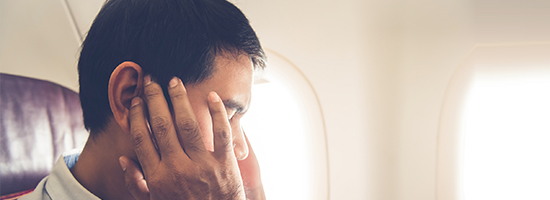
Are You Experiencing Ear Barotrauma?
If your ear pain is related to a change in pressure around your ear, it’s a condition called ear barotrauma. It produces a type of “stuffed up” feeling you might have experienced while on an airplane that was taking off or landing or while scuba diving. It’s often harmless and nothing more than a temporary inconvenience. Still, ear barotrauma is sometimes serious enough to require treatment.
What Causes Ear Barotrauma?
Specifically, it’s a blockage of the Eustachian tube that links the ear to the mouth that typically causes ear barotrauma. This tube is important because it helps maintain balance when ear pressure changes. But if it’s blocked, a pressure change may produce any of the following symptoms:
- Mild hearing loss
- A “stuffed up’ or full feeling in your ears
- General ear-related discomfort
- Dizziness
Ear barotrauma that’s moderate or severe could lead to eardrum pain and fluid leakage if it’s not treated. In some instances, untreated ear barotrauma may contribute to long-term hearing loss. There’s also the risk of having a ruptured eardrum with severe ear fullness.
How Is a Diagnosis Made?
If ear barotrauma is mild, it usually goes away after a few minutes. But if the eardrum (tympanic membrane) has ruptured, it could several months to fully recover. If symptoms are continuing, diagnosis typically involves finding an underlying source. You’ll likely be asked about what you were doing when the change in ear pressure occurred. The initial examination typically involves looking for an ear infection and applying bursts of air to the affected ear to check for a buildup of blood or fluid behind the eardrum.
How Is Ear Barotrauma Treated?
Mild or moderate issues with ear barotrauma often go away with little or no medical intervention. However, you’ll likely be advised to keep your ears clean and avoid situations where there’s a dramatic pressure change until all signs of ear barotrauma are gone. With moderate or severe symptoms, certain techniques may be used to open the Eustachian tube. With severe ear barotrauma, it may be necessary to implant ear tubes into the affected ear to relieve middle ear pressure.
Yawning and chewing gum when on an airplane and being careful how you descend and breathing through your nose when going up while scuba diving are some of the precautions you could take to reduce your risk of having issues with ear barotrauma. Some people also benefit from taking a decongestant or antihistamine before participating in any activities that may involve a chance in pressure.






